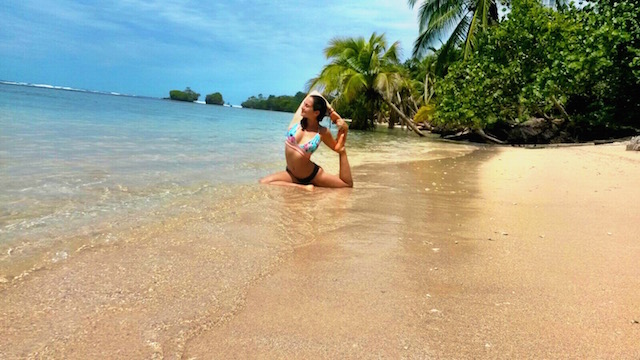Two months ago, I landed on the shore of Red Frog Beach with a backpack full of half-moldy clothes.
I had close to zero expectations about my upcoming “work exchange” and a vague idea of how to get to the eco-lodge where I planned to teach yoga for the few next weeks.
The day before, I embarked on a 12-hour journey from Costa Rica to Panama—an unexpected, adventure-packed day embellished by dancing outside a broken-down bus, jumping off at a Caribbean town for an exotic fruit tour with a new friend, and creating a fake ticket out of Panama to get by the border guards.
After a 15-minute boat ride from the main island, through the mangroves and jungle-lined waters, the captain of my shabby boat bid me farewell. As I walked from the dock into the seemingly endless jungle, I realized I had no cell service or way of knowing if I was indeed making my way toward Palmar Tent Lodge (I had missed the one small sign).
As yoga has reminded me every day: when in doubt, breathe and carry on. As I passed signs warning about the Cayman alligators, my adrenaline spiked, but I was finally greeted with another Palmar Lodge sign.
When I arrived at “The Staff House,” a lively group of about seven other work exchange staff welcomed me with warm smiles and hellos. And then, in what felt abrupt to my fresh perspective, they went on about their day. I decided to join the morning yoga class to center into what would come to be my calming workspace for the next two months.
At the time of my arrival to the quiet dock of that small Panamanian island, all I could think about was whether or not I was going to make it safely through the jungle to my destination. As I sunk into my yoga teaching, sharing a home with a handful of international characters, two months turned into more than a few lessons.
Here’s what I didn’t expect to learn when I moved to a remote island in Central America with few expectations beyond teaching yoga:
We have the ability to decide which of our emotions to fuel. It is one of our most overlooked yet powerful human capabilities.
Immediately upon setting foot on the island, I felt an energetic peace and tranquility. The isolation allowed for self-reflection and appreciation, along with more time to connect with others. The lack of constant WiFi connection was refreshing—and then almost forgotten.
I experienced the simple joys I had as a kid, like playing Guess Who? and Monopoly with new friends. Yet I realized after a short time the possibility for this peace and simplicity to flip to boredom and frustration.
I was reminded of how important it is to check in with our feelings and understand where they are coming from. From there, we can decide which loop to “feed,” whether it be self-love versus judgment and jealousy of others, or rejection of new versus intrigue of a widened perspective.
Oftentimes, the emotional switches, for better or worse, are induced by a collective energy.
The smiles and good humor of a staff member who woke up on the “right side of the bed” could uplift the whole group. On the other hand, a complaint or insult from a housemate had the power to turn an afternoon sour. I was generous with my laughter and became more cognizant of how my words and actions could affect others.
The truth is, a collective energy exists wherever we are in the world, and it is difficult to “opt out.” Living on a remote island with seven diverse individuals, I came to realize that it’s vital that we work with this force, building compassion and uplifting others to the best of our ability.
As time went on, I grew increasingly reliant upon and aware of Mother Nature and felt more connected to the earth.
Every morning, I began my yoga class by urging students to sharpen their awareness of their connection with the outside world—starting with their most basic relationship—the breath. Without instruction, just by noticing this exchange, I believe we build a stronger appreciation and respect for nature.
“Shifting our attention to the outside world, away from the breath, take a few minutes to listen. Deeply listen. Maybe truly listening for the first time to the acute sounds behind the waves, the birds, the trees, the insects, the leaves,” I would say. Each day brought a new song and an invitation for a fresh insight.
Under typical conditions, we can be quick to place labels on our relationships—acquaintance, friend, best friend, semi-extended family, exclusive partner, et cetera. While isolated on a remote island, the lines blurred to form a “pseudo-family.”
As we were roommates and near strangers, I was surprised how easy it felt to confide in one another. A type of pseudo-family spontaneously formed, wherein in one day someone could trust another with their deepest self-conscious fears, then later argue with the same person over cleaning duties.
I started to question whether the labels we cling to in a traditional setting bar us from jumping into a deep connection with someone new, due to social norms and pressures. How incredible would it be if we stopped spending so much time trying to force a value or meaning on a relationship, directing our energy instead to simply enjoying our time with others, and having that be enough.
It may never feel like the “right time” or “perfect time” to make a change.
I encountered many people from all walks of life, including nomads like myself, wondering where life would take them next. What seemed to turn excitement into stress for some people was figuring out their place in this pseudo family and how expectations of others aligned with their own true path.
I started to question the concept of perfect planning and a sort of optimal alignment of the cosmos. I remembered how important it is to let go of a stronghold on just one way of thinking about the universe. Perhaps when we believe in a “perfect plan,” it sets us up for the thought that one miraculous morning we will wake up and know that today’s the day—I’ll quit, I’ll ask him/her out, I’ll move on, whatever it may be.
But it doesn’t have to be so clear cut—and the “right” time may never come. Once we understand this, we take the pressure off and reclaim the responsibility required to take action. From whichever lens we view life, we must acknowledge that a certain degree of power always remains in our hands.
Decisions may never feel right. I could have stayed on the island for another year, or I could have left a week in, and both would leave me off in a great place. I know that there truly is not only one “correct” path for me.
We make decisions that shape our future based on our intuitions and goals, both personal and collective, yet it isn’t a win or lose call—and that’s liberating.
I understood more deeply how reliant—and hence connected—we are to Mother Nature. When we give ourselves permission to root down and deeply listen, we can become a part of an eco-system, like a limb of an organism. A pseudo-family friend of mine shared with me, “If you tell a tree a secret on one side of the island, a flower on the other side will hear it.”
In the end, even in tropical paradise, it was again the people who taught me the most—about people—and in turn about myself. We can offer windows of light to others to look into for inspiration, laughter and support. In turn, others will become mirrors for us, illuminating the areas in our life that needs work and eliminating the illusion of separation.
~
Author: Shoshanna Delventhal
Image: Courtesy of Author
Apprentice Editor: Melanie Jackson; Editor: Toby Israel
~







Read 1 comment and reply